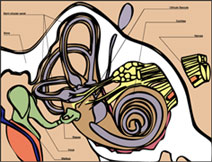| Home A B C D E F G H I J K L M N O P Q R S T U V W X Y Z |
| Home |
Tinnitus: Symptoms, Causes, Diagnosis,
|
|
It's hard to imagine the discomfort and disruption that tinnitus, or ringing in the ears, can cause in the lives of sufferers. They hear a ringing, hissing, roaring, chirping, buzzing, drumming or whistling noise when no outside sound is actually present.
These sounds can be intermittent or constant, often preventing them from sleeping, concentrating on work, and enjoying their normal activities. Severe forms of the condition have contributed to job loss, divorce, anxiety, depression, violence and even suicide.
Some sources say that up to 35% of the population has tinnitus in varying
degrees.
Causes of Tinnitus
There are many theories about how tinnitus sounds are actually produced inside the head, but nobody knows for sure. Since tinnitus is a symptom, not a disease, the best way to treat it is to determine what caused it.
Tinnitus can be a symptom of Meniere's disease, an inner ear disorder that also causes dizziness and nausea. But many other causes of tinnitus have been identified, such as:
 ear
infection
ear
infection Sometimes there will be two or more causes of tinnitus in one patient, for example noise and stress occurring together is a common combination.
Diagnosis Of Tinnitus
Ear, nose and throat specialists attempting to diagnose tinnitus will ask if you have had vertigo or imbalance, head trauma or other illness, and what medications you're taking. They may do a physical exam of the head, neck, and ears, test your blood pressure and pulse, and recommend an audiologic evaluation.
However, sufferers who have done some research on their own often end up diagnosing themselves with tinnitus.
Tinnitus Treatments
Conventional medical treatments such as surgery or drugs don't cure tinnitus. Some doctors treat the condition with sedatives, anti-depressants, muscle relaxants or antihistamines. In more severe cases, special hearing aids or masking devices have been prescribed, or surgical injections of lidocaine directly to the inner ear.
Alternative treatments like hypnotherapy and acupuncture have also been used with varying degrees of success. Excellent results have been achieved through homeopathic remedies that are formulated specifically for each type or cause of tinnitus. These natural-source tinnitus remedies help most sufferers either reduce or eliminate their symptoms over time.
Prevention of Tinnitus
Those who have tinnitus can take steps to prevent or reduce the intensity of their ear ringing by:
Abouth the Author
John Currie has been researching and treating tinnitus for 20 years. His
tinnitus treatment remedies have an
85% success rate, with most patients experiencing total or substantial
relief. T-Gone Remedies are made of specially selected herbs and plants
that are gentle and safe, with no side effects
|
Glossary References Links Contact
|